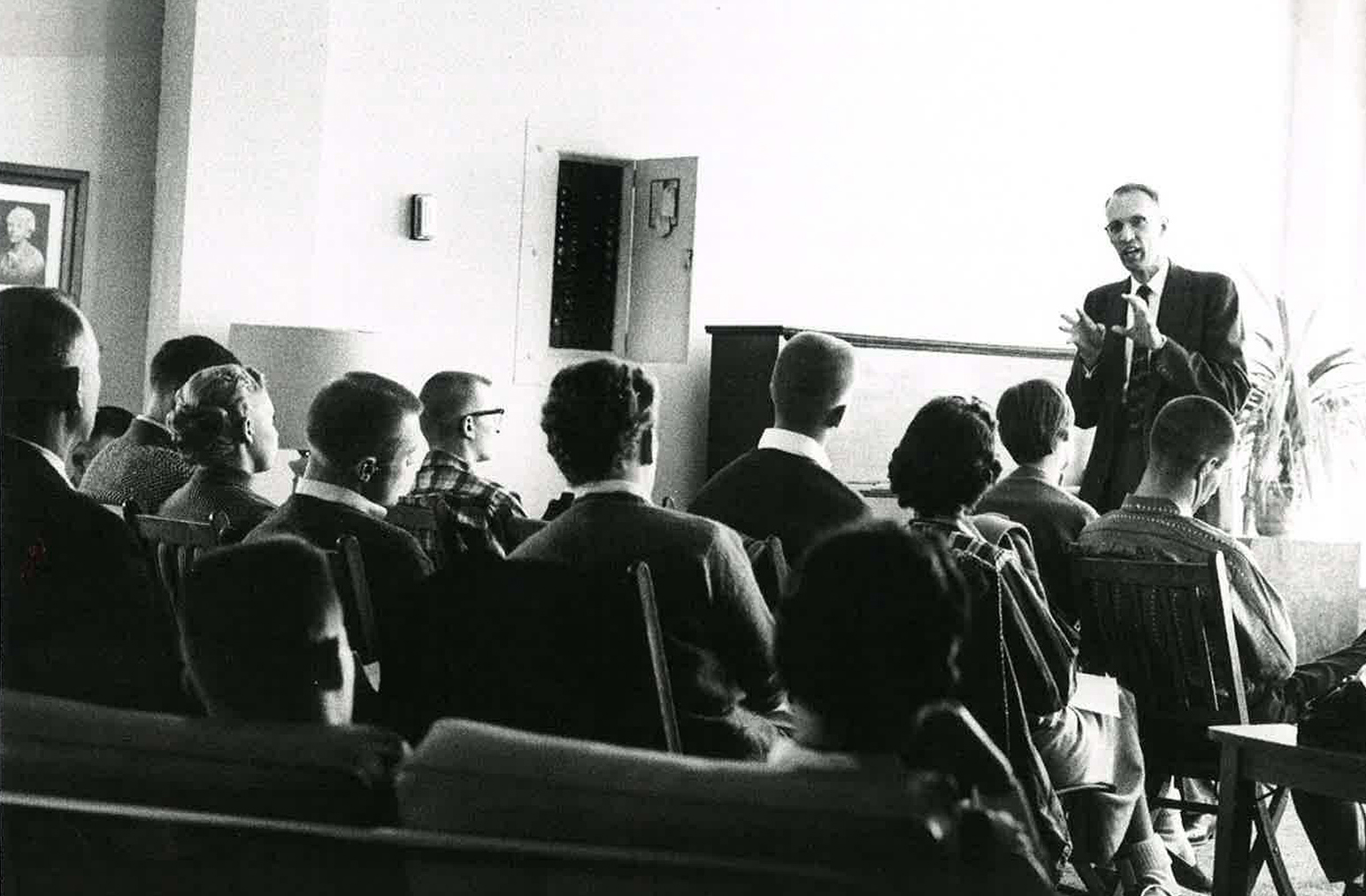
Dr. William E. Hall, one of Talent Plus’ founders, worked as a classroom teacher in a one-room schoolhouse in a small community in Oregon. He, like any teacher, saw that some kids were incredibly successful and some kids struggled. He was particularly intrigued by the students who excelled. If he could spend more time with them, particularly the top performers, how much better could they do?
A History
Dr. Hall attended graduate school at The Ohio State University to study psychology. The University of Nebraska soon offered him a job teaching in the educational psychology department. But he was clear with them: he was not interested in studying kids who were not succeeding in school. He wanted to study the successful ones.
While at the University of Nebraska, Dr. Hall and one of his students, Dr. Donald Clifton, started a foundation called the Nebraska Human Resources Research Foundation. They matched college student leaders with high school students in the community who were identified by teachers as leaders.
It was Dr. Hall’s belief that these mentorships created a sense of belonging and a template to create more relationships and if student leaders felt this sense, they’d pass it onto others. He believed in his community and took on a philanthropic role even though he wasn’t well off. He understood from early in his career the importance of getting to know people and focusing on relationships.
Dr. Hall and Talent Plus
After teaching, Dr. Hall started thinking about how he and Clifton could bring this idea to the business world. They left the University and started Selection Research, Inc. (S.R.I.), which eventually purchased Gallup in 1988. He wanted to shed light on how outstanding employees and outstanding managers excel when they love what they do — and how to help them do more of it.
In 1989, Doug Rath, Kimberly Rath and Sandy Maxwell formed Talent Plus, Inc. and invited Dr. Hall to join them. They wanted to focus on selection and impact people’s lives while addressing Dr. Hall’s original question: “What would the world be like if everyone got to do what they were good at?”
Together, they focused on Dr. Hall’s predominant goals — to find out what people are really good at, find a role for them and ensure they had the right manager. In addition, they focused on relationships — that’s the “Plus” in Talent Plus, says Cydney Koukol, executive vice president of communities at Talent Plus.
As Talent Plus began to build this system and set of structured assessments, Dr. Hall believed that when you ask the same questions to each candidate and understand how top performers answer those same questions, you learn who’s the best. In addition, he utilized open-ended questions like “Tell me more.” If you have 20 candidates and you don’t ask them the same questions, how do you know how to differentiate one candidate from the next?
“The key to the structured interview,” says Doug Rath, “Is questions that then allow you to differentiate people who are going to be very successful and people who are going to be average or people who will fail.”
Our assessments are specialized to the industry and/or role. Hospitality assessments are different from retail, for example, and then are sometimes calibrated to individual client needs.
Lessons We Can Learn From Dr. Hall
Talent Plus’ future is built on its rich history and the core lessons we’ve learned from Dr. Hall’s legacy. Here’s what we can learn from his teachings and how you can apply a few of his key tenants to your own business.
Lesson 1: Learn About People — Why They Behave the Way They Do and How Relationships Can Be Used for the Good of People
Everyone has a different story and you don’t know what wins, obstacles and life experiences they’ve had until you talk to someone. Making connections and maintaining relationships gives you and others a sense of belonging.
Lesson 2: Ask the Same Questions in Interviews
Compare candidates objectively. If you’re interviewing several people, you have to ask them the same questions and those questions must be written in a way where you get thoughtful answers that are scientifically validated.
Lesson 3: A Sense of Belonging has a Ripple Effect
Whether in your community or in your workplace, a sense of belonging is contagious. Pass it on.
Lesson 4: You Must Accept People for Who They Are and What They Have to Offer
Rather than try to change those around him or convince them to believe or do what he thought was right, Dr. Hall accepted those around him and built a community around him.
Lesson 5: If You Focus on the Things That People Are Good at, There’s a Lot More Opportunity for Improvement
From very early in his career, Dr. Hall wasn’t focused on changing his students or people in their places of work. He was focused on learning in what areas they were successful and fostering that success. Why? Top talent performs 100 to 1,000% better than average talent or people who have failed.
While there’s always room to grow and improve on weaknesses, focusing on strengths and spending time to become even better and more successful using those strengths will ultimately serve the employee and their work more. Help employees learn how they’re hardwired and grow those strengths.
Take the Next Step Using Positive Psychology
Talent Plus was built up on Dr. Hall’s ideas of learning about people and their strengths. Read more on Talent Plus’ history and how we help businesses using positive psychology.
You can also read more about Dr. Hall’s insights in a book written by one of his mentees and a former Talent Plus employee Jim Meehan. The book is called Hall Ways to Success and Significance: The Positive Force of Dr. William E. Hall.
Talent Plus
Talent Plus is a team of industry experts who collaborate to deliver insightful and impactful content. Our blogs are designed to provide practical advice and fresh perspectives, helping you stay informed and ahead of the curve.
Latest Posts: Blog

Blog September 25, 2025
What Do We Really Mean When We Talk About Talent?
Unlock the secrets of talent in the workforce. Learn how to identify inherent abilities for excellence in your team.
Read More
Blog July 08, 2025
How to Manage Difficult People
Master how to manage difficult people at work with six effective strategies for maintaining productivity and engagement.
Read More
Selection April 28, 2025
The Science of Talent Reduces Turnover in Credit Unions
Learn how Credit Unions use Talent Plus Solutions to decrease turnover, better engage employees and increase performance.
Read More
Blog April 25, 2025
Building a Better Healthcare Team: Nebraska Spine Hospital’s Data-Driven Talent Approach
Find out how Nebraska Spine Hospital partners with Talent Plus to enhance employee engagement and organizational culture.
Read More
Blog March 14, 2025
How Personalized Recognition Reduces Turnover and Builds Loyal Hospitality Teams
Explore effective strategies for hospitality employee recognition that appreciate individual contributions and enhance team motivation.
Read More
Blog February 27, 2025
Leading With Purpose: Seven Qualities of a Good Manager
Explore the 7 qualities of a good manager and enhance your leadership skills for greater team success and communication.
Read More

